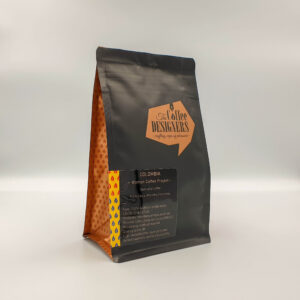Shop
Yellow Bourbon 250 g
35,00 lei
Specialty Coffee from Sao Paulo, Brazil
Type: 100% Arabica • single origin
Producer: Morgiana
Processing method: natural
Quality Score: 82
Cup: sweet and balanced, fruity, with notes of milk chocolate and hazelnut, soft acidity
Net weight: 250 grams
Bag size: roughly 19 x 11 x 8 cm
For more details about this coffee, please click the “Description” tab below.
All picture shown are for illustrative purpose only – packaging may differ slightly.
All our coffees come from micro lots and are available in very limited quantities. Once it’s out of stock, a coffee variety will be available again only when a new crop is ready.
Out of stock
Description
Over time, Brazil and coffee have become almost synonymous. Coffee history started around 18th century, initially grown for domestic consumption in the early-mid 19th century, Brazil coffee production started to expand.
In 1820, Brazil was already producing 30 percent of the world’s coffee supply and by 1920, it accounted for 80 percent of the global total. Brazil produces about 1/3 of the total world coffee production (including Arabica and Robusta) hence the importance in the global setting. Brazil has contributed to coffee worldwide by the number of varieties, hybrids, either spontaneous grown or by laboratory creation that will further spread among coffee-growing countries everywhere.
In order to maintain production at the scale and scope for which Brazil is famous, the national industry has adopted specific and innovative means to achieve both picking and processing in the most highly efficient and organized manner possible, and the structure of the average farm or estate is designed around utilizing these systems and maximizing the yield potential per hectare. Besides its efficient production and massive yields, Brazil is opening new source for microlot coffees, with the support of the producers that are focused on putting out smaller quantities of hyper-focused, high-scoring and superior quality.
The Bourbon varietal is a well-known cultivar C. arabica that originated on Île Bourbon – an Island east of Madagascar. Is thought to be either a natural hybrid of Red Bourbon and Botucatu Yellow or a natural mutation of Red Bourbon. The Yellow Bourbon coffees was discovered in 1930 in the state of São Paulo, one of Brazil’s most important coffee regions. It was released commercially in 1945 and has developed a reputation for excellent cup quality, including bright acidity and elevated sweetness.
Natural processed coffes are typically either dried on the trees before harvesting (called Boya), or picked and laid out on patios in order to finish drying before being hulled. This processes tend to lend the coffees a nutty creaminess that has a more tempered fruit tone.
Traditionally, most espresso recipes have included Brazil due to its characteristics: low acidity, high body, creamy, caramel, and chocolate notes, with a significant amount of sweetness.
Additional Information
| Weight | 0,250 kg |
|---|---|
| Dimensions | 19 × 11 × 8 cm |






